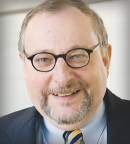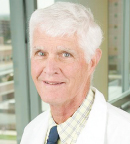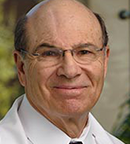
Fred R. Hirsch, MD, PhD

Paul A. Bunn, Jr, MD

John D. Minna, MD
The COVID-19 pandemic (caused by infection with the SARS-CoV-2 coronavirus) has created a host of diagnostic, treatment, and follow-up problems for patients with cancer of all types, and this is particularly true for patients with lung cancer, their families, and providers. Everyone wanted to know and was worried about whether patients with lung cancer be more or less likely to contract COVID-19? And if they did so, would they have more serious disease? Would their susceptibility to and course with COVID-19 be influenced by the type of treatment they received, such as checkpoint inhibitor blockade, chemotherapy, radiotherapy, or surgery? How would COVID-19 in patients with lung cancer respond to COVID-19–targeted therapy?
To address these concerns from our patients and the large cadre of thoracic oncologists treating patients with lung cancer, the COVID-Lung Cancer Consortium (organized through Icahn School of Medicine at Mount Sinai, New York) was established to bring the lung cancer community together during the COVID-19 pandemic. In addition, it was clear that many of the resources created by the lung cancer translational research community could, in turn, be of potential benefit to studying and understanding SARS-CoV-2 virology.
For example, there are few human lung epithelial cell strains where SARS-CoV-2 replicates. The large panel of human lung cancer and lung epithelial cell strains that also express ACE2 could provide a totally new resource for SARS-CoV-2 preclinical studies, such as drug testing. Thus, we needed an organized format for discussing responses to urgent patient issues during the current situation; how different institutions, organizations, and investigators could collaborate on issues related to unforeseen changes in patient care; clinical trials; and the development of collaborative relevant scientific projects.
Thoracic Oncologists and Patient Advocates Come Together
The forum has representation from thoracic oncology investigators at multiple academic institutions, patient advocate organizations, the National Cancer Institute, the National Institutes of Health, and professional organizations (such as ASCO, the American Association for Cancer Research, and the International Association for the Study of Lung Cancer). More than 70 people are participating in virtual meetings every second week. As the initiators, we think this demonstrates an outstanding example of how the patient care and cancer translational research “community” came together to help our patients with lung cancer and learn from this epic event. We think it likely that many practices we are being forced to develop in response to the pandemic will be adapted and remain, even after the COVID-19 pandemic is over.
From a patient care point of view, we need to develop an in-depth understanding of several issues: telemedicine; wearable device monitoring at a distance (eg, pulse oximetry, temperature); health-disparity challenges; surgical and diagnostic procedures; development, accrual, and execution of clinical trials; patients’ understandable fear of contracting COVID-19 infection during clinical interactions; and the role of diagnostic and surveillance testing for COVID-19.
A key aspect of this consortium is to prospectively collect data on large numbers of patients with lung cancer to answer these questions through trials such as TERAVOLT and COMBAT–COVID-19. A variety of perspectives and information on the approaches, educational aspects, and scientific projects and opportunities being developed at different locales are being discussed. The consortium also has collaborations with infectious disease and epidemiology experts.
The National Cancer Institute is providing new funding opportunities and advice on how to deal with the sudden change of scientific focus and questions brought about by the COVID-19 pandemic. Overall, the consortium provides a venue to identify challenges and opportunities, harmonize activities, and facilitate collaborations on these urgent scientific matters.
DISCLOSURE: Dr. Hirsch is a consultant/advisor for Novartis, Bristol-Myers Squibb, AstraZeneca, Merck, Genentech/Roche, Ventana, Helsinn, Loxo Oncology, Bayer, HTG Molecular Diagnostics, Biocept, and AbbVie; is on the speakers bureau for AstraZeneca and the University of Colorado; and has received institutional research funding from Genentech, Mersana Therapeutics, Amgen, Bayer, Merck, biodesix, HTG Molecular Diagnostics, Clovis, and Rain Therapeutics. Drs. Bunn and Minna reported no conflicts of interest.
Disclaimer: This commentary represents the views of the author and may not necessarily reflect the views of ASCO or The ASCO Post.
This commentary originally appeared in The Cancer Letter on April 24, 2020.

